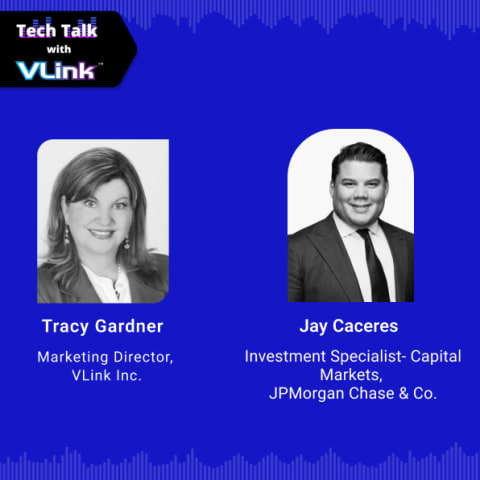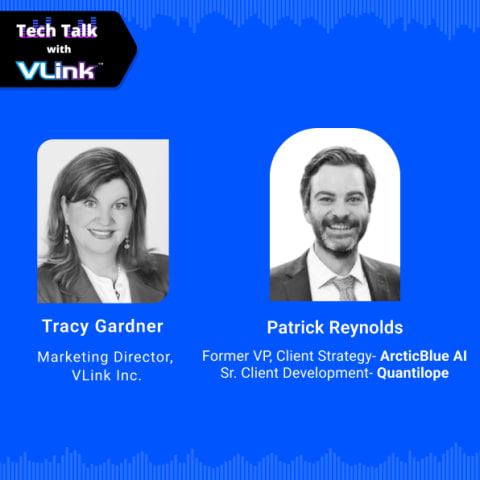The insurance industry, once a leader in traditional marketing strategies, is now facing a paradigm shift. Traditional AI marketing campaigns, often characterized by broad-brush approaches, generic messaging, and limited personalization, have struggled to effectively engage modern consumers.
Challenges like inefficient customer segmentation, difficulty in predicting customer behavior, and the inability to deliver timely, relevant messages have hampered the industry's ability to optimize campaigns and maximize ROI.
Enter Artificial Intelligence (AI). This powerful technology is poised to revolutionize the insurance sector, offering a much-needed solution to these persistent challenges. With AI, insurers can now unlock unprecedented opportunities to optimize campaigns, personalize customer experiences, and ultimately maximize their return on investment (ROI).
The potential of AI in the insurance market is immense. According to Forbes estimates, the AI solutions for insurance marketing is projected to reach a staggering USD 35.77 billion by 2030, growing at a CAGR of 33.06%.
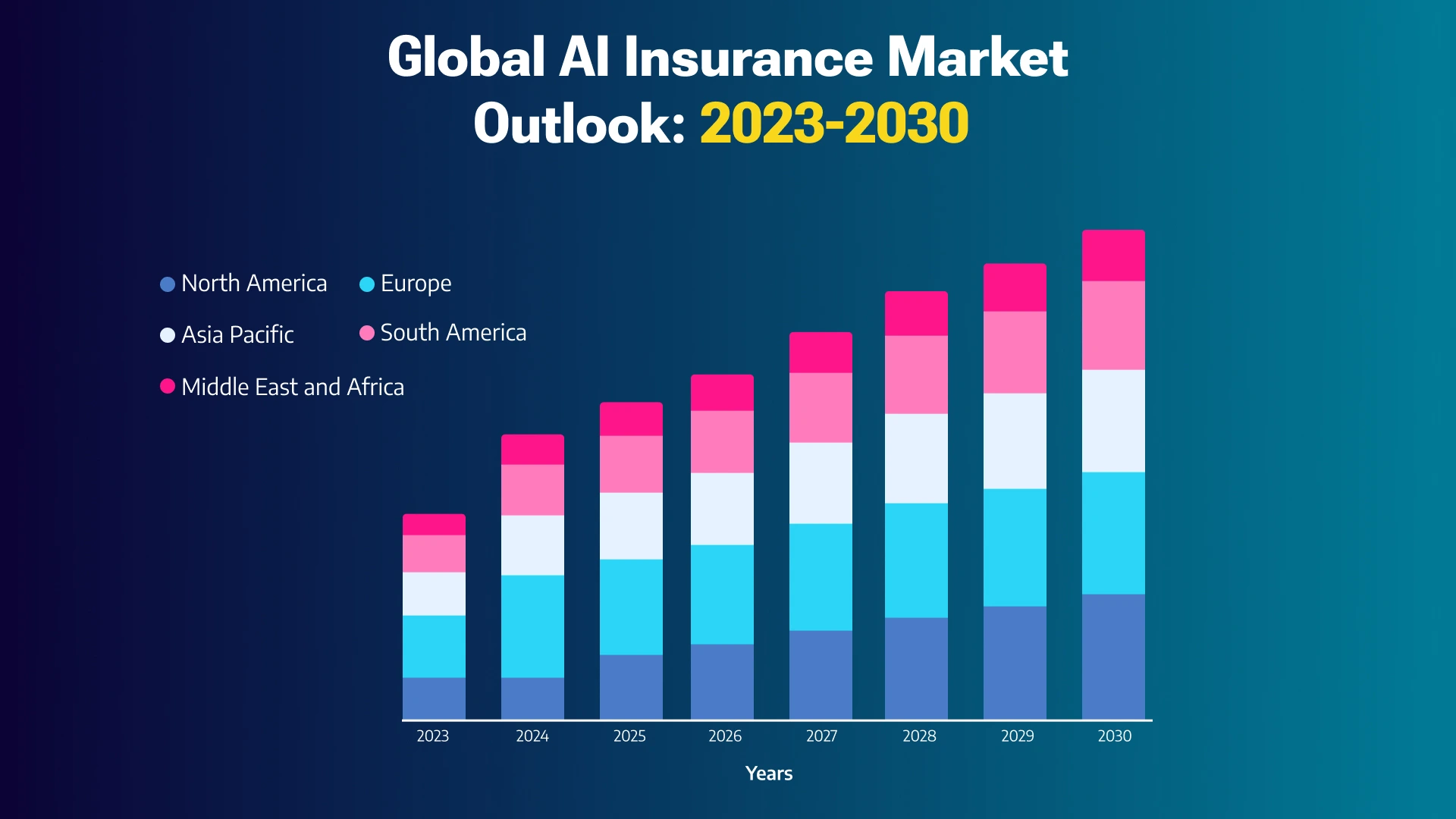
This data highlights the significant and positive impact AI is having on key performance indicators in the insurance industry.
In this blog post, we will delve deeper into how AI is transforming the multifaceted dynamics of the insurance sector. We will explore how AI is revolutionizing customer engagement, optimizing campaigns, and maximizing ROI.
The Impact of AI for Campaign Performance in Insurance
AI is revolutionizing the insurance industry, significantly impacting campaign performance and ROI. Here are ten ways:
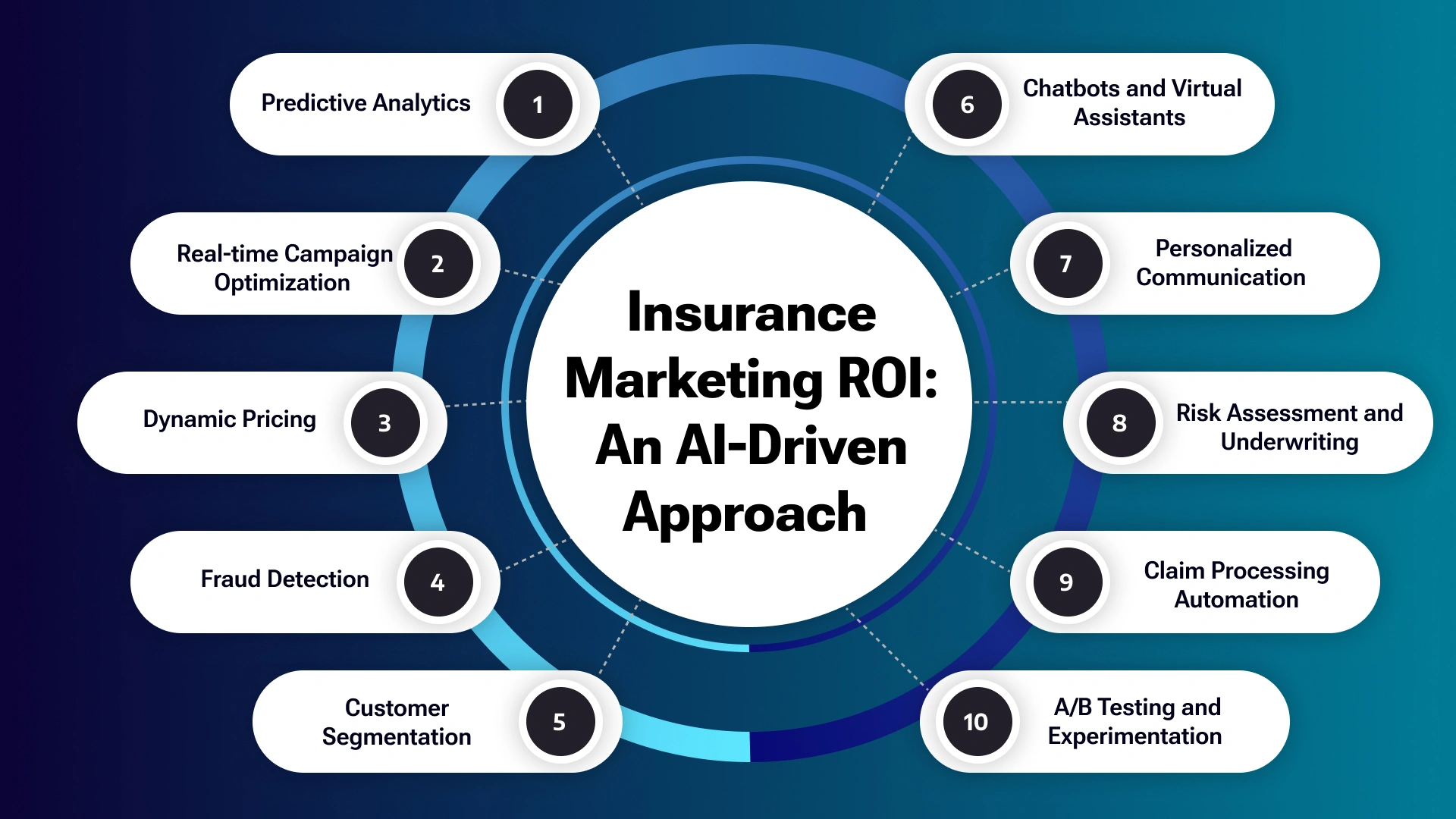
1. Predictive Analytics: The Algorithms of artificial intelligence in insurance industry provide possibilities for analyzing huge customer data sets across demographics and behavior, as well as purchase history. Identification of high-value customers, anticipation of needs, and development of personalized campaigns can be achieved through AI solutions for insurance marketing.
2. Real-Time Campaign Optimization: In With AI-fueled tools, careful monitoring of the real-time performance of an ongoing campaign supports the making of data-driven adjustments in optimizing messages, targeting, and budget allocation towards maximum personalized efficiency.
3. Dynamic Prices: Use AI in marketing to dynamically set prices according to the customer's risk profile, the situation in the market, and competition. It'll help your potential customers to get new businesses and your current customers to retain while increasing revenue.
4. Fraud Detection: To build an artificial intelligence in insurance industry for fraud detection system in which claims and policy applications may be detected and prevented by fraud, which would be able to affect your company's business and profit for good.
5. Customer Segmentation: AI in insurance market enables the segmentation of a customer base into similar groups based on some characteristics that make them different from other groups. This makes possible the launching of specific AI optimized PPC campaigns that resonate well with such segments and eventually improve their conversion rate.
6. Chatbots and virtual assistants: The introduction of chatbots and virtual assistants in your generative AI in insurance marketing strategy, creates a catalyst for 24/7 customer care service lines as they respond to queries and assist clients in purchasing and claiming policies. Overall, it enhances the experience of customers and cuts down the costs of operations.
7. Personalized Communication: In addition, using AI in marketing solution in your insurance market strategy, customer interactions resultantly assessed and outcomes of preferences personalized for reaching him/her through various channels- email, SMS, or even social media- thereby strengthening ties between customers and enhancing efficacy in campaigns designed.
8. Underwriting and Risk Evaluation: Using AI marketing solutions for insurance marketing process, use AI-enabled risk assessment models to measure the risk profile of your potential customers more accurately. This will give you impeccable underwriting and tailored insurance products.
9. Automated Processing of Claims: This generative ai in insurance market, automatic workflows for claim processing enabled thereby reducing the time spent in processing claims and lowering the errors while increasing customer satisfaction. It optimizes insurance campaigns resource allocation as well.
10. A/B Tests and Experimentation: In this, let AI solutions for insurance marketing handle designing and implementing A/B tests across the various messaging, image streams, and targeted audiences within the campaign. This will give room to identify the most productive means and facilitate continuous optimization of insurance campaigns.
Key Benefits of AI-Driven Marketing Campaign for maximizing ROI in Insurance
The insurance industry is a data-rich environment, and using AI in marketing excels at harnessing this data to unlock significant value. Here are some key benefits of AI in marketing campaigns to improve ROI.
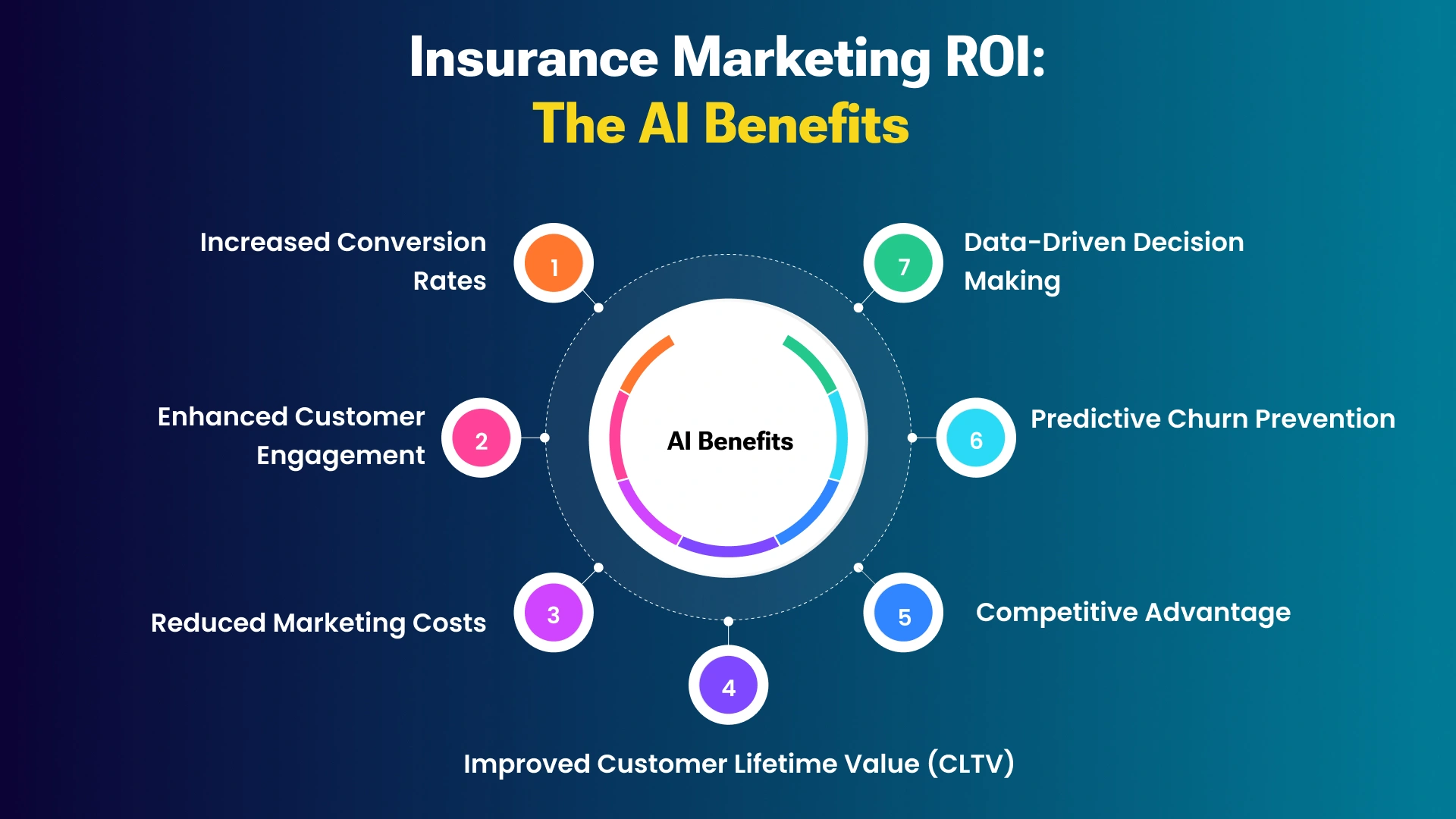
Increased Conversion Rates:
Bye-bye generic messages that fit nobody and nothing. AI solutions for insurance marketing help in such hyper-personalization in building campaigns for individual customer profiles, preferences, and risk factors. That granularity touches the deepest chord, thus enjoying greater resonance or engagement, leading to higher conversion probabilities in terms of buying a policy, filing a claim, or only interacting positively with your brand.
Enhanced Customer Engagement:
AI in insurance market would help forge more profound relationships with customers through interactive experiences. The chatbots at this point now provide all-day, every day, support to respond to queries and help customers navigate through complicated processes. Personalized content through proper channeling at the right moment keeps customers updated and involved and strengthens brand loyalty.
Reduced Marketing Costs:
Increasing efficiency in operations by automating repetitive assignments such as data entry and AI optimized PPC campaigns reporting frees valuable resources from organizations that they would otherwise expect to use to manage actual marketing budgets better. By predicting and targeting the right audiences through generative AI in insurance market, you can transform ad dollars and spend on the most effective channels.
Improved Customer Lifetime Value (CLTV):
AI in the insurance market predicts future needs based on individual behavior and helps the organization spot cross-sell and up-sell opportunities. This not only improves revenues per customer but also enhances the existing relationships with customers in the long term.
Data-Driven Decision Making:
AI solutions for insurance marketing is a treasure house of data-driven insights on customer behavior, market trends, and campaign performance, enabling insurers to make informed strategic decisions about their marketing and resource allocation.
Predictive Churn Prevention:
AI integration for digital transformations can identify customers at high risk of churn based on their behavior, demographics, and other relevant factors. Proactive outreach with personalized offers and improved service can significantly reduce churn rates and retain valuable customers.
Competitive Advantage:
As stated earlier, the concept of competition today cogently comes from artificial intelligence. What insurance implies is incorporating AI in differentiating itself from the competitors, thinking to the maximum possible extent, personalized experience, better optimization of the campaign, or broader customer insight.
Insurance companies can increase the ROI of their marketing operations and develop stronger and more lucrative customer relationships by using AI with full authority.
Best Practices for Implementing AI in Insurance Marketing Campaign
AI is radically changing insurance, and there are great opportunities to improve marketing ROI within the industry. These are some tips of using AI in marketing to yield some of the greatest results possible:
1. Set Clear Goals and KPIs:
Set well-defined, measurable, achievable, relevant, and time-bound (SMART) objectives for your AI marketing projects. For example, you might have goals such as increasing customer acquisition rates, reducing customer churn rates, improving customer satisfaction, and optimizing advertising spend.
By using artificial intelligence in insurance industry, you can easily track important key performance indicators for instance regarding conversion rates, customer lifetime value (CLTV), cost per acquisition (CPA), and return on ad spend (ROAS) to assess the performance of your AI-enabled campaigns.
2. Build a Strong Data Foundation:
Combine and collect data from internal and external sources like first-party customer data, website analytics services, social networks, and CRM applications. Ensure that the data is high-quality and accurate to work effectively with the AI in insurance marketing system.
Define a strong data governance framework to ensure your data will be safe, private, and compliant with regulations like GDPR and CCPA.
3. Build a Skilled Team:
To truly harness the potential of AI, it's crucial to assemble a team of skilled and passionate individuals. Recruit and hire top-tier talent with deep expertise in artificial intelligence, machine learning, and data science.
These individuals will be the driving force behind innovation and digital transformation, enabling your organization to stay ahead of the curve.
4. Choose the Right AI Tools:
Evaluate and select AI tools for marketing that are specifically developed to suit the industry of insurance, such as AI-powered marketing platforms, chatbots, and predictive analytics.
Consider a pilot project to evaluate the effectiveness of your AI tools for marketing before widespread implementation. This allows you to observe and measure their impact on a smaller scale. Utilize AI-driven tools to automate routine processes such as ad bidding, audience targeting, and content optimization.
You can also explore with a pilot project to check the effect of your AI tools for marketing be able to get significant ones before wider usage. Utilize AI-driven tools to automate routine processes like ad bidding, audience targeting, and content optimization.
5. Focus on Customer Segmentation and Personalization:
Customers can be segmented using AI algorithms for their identification based on demographics, behavioral patterns, the choices they make, and even the risk profiles that come into play.
Personalize messages and offers through all channels-from automated email campaigns to social media, and to the website itself. These can be done via recommendation engines to increase ad performance with content data and ai content.
6. Continuous Monitoring and Evaluation:
Regularly monitor and evaluate campaign performance using key metrics and make necessary adjustments based on the insights gained.
Keep up to date with the latest advancements in AI and machine learning to stay ahead of the curve.
By following these best practices, insurance companies can bring about marketing ROI improvements, customer experience enhancements, and sustainable growth within the competitive insurance market.
Pro Tips:- Implement AI-driven chatbots to deliver round-the-clock customer support, addressing inquiries and guiding customers through the purchase process efficiently. Use AI to customize customer journeys across touchpoints from initial contact through policy renewal, and beyond.
But how can we truly measure campaign success in the insurance industry? Let’s check it out in detail.
How to Measure Marketing Campaign Success in Insurance?
Successfully measuring AI marketing campaigns in insurance requires a shift in perspective. Go beyond traditional metrics and focus on these key areas:
Model Performance: Evaluate the accuracy and precision of AI models in predicting customer lifetime value (CLTV), identifying churn risks, and segmenting customers effectively. Track metrics like mean absolute error (MAE), root mean squared error (RMSE), and F1-score to assess model performance.
Campaign Optimization: Analyze how AI-driven insights impact ROI, conversion rates, and customer acquisition costs. Measure the incremental lift in performance compared to traditional AI marketing campaigns. For example, track the increase in policy sales or premium revenue attributable to AI-powered personalized offers.
Customer Impact: Assess how AI enhances customer engagement, satisfaction, and overall experience. Monitor metrics like click-through rates, open rates, response rates, and net promoter score (NPS). Evaluate the impact of AI-powered chatbots or virtual assistants on customer satisfaction and resolution times.
Continuous Improvement: Regularly refine AI models, ensure data quality, and conduct A/B testing to optimize campaigns. Track the evolution of model performance over time and identify opportunities for improvement. Implement a feedback loop to incorporate learnings from campaign results and customer interactions.
By focusing on these areas and using specific metrics, insurance companies can gain a deeper understanding of the impact of AI on marketing campaigns and make data-driven decisions to optimize their strategies.
AI Integration Challenges in Optimizing Insurance Campaign Performance
Several challenges exist in optimizing campaign performance with AI.
Firstly, access to high-quality, accurate, and comprehensive data is crucial. Ensuring data quality and addressing gaps can be a significant hurdle to performance marketing optimization.
Secondly, protecting customer data privacy and security is paramount. Implementing robust data protection measures and complying with regulations like GDPR and CCPA is essential.
Thirdly, AI algorithms can inadvertently reflect and amplify existing biases present in the training data, potentially leading to unfair or discriminatory outcomes of your performance marketing optimization.
Integrating AI solutions with existing systems can be complex and time-consuming, requiring significant IT resources and expertise. Moreover, finding and retaining skilled AI professionals can be challenging for.
Furthermore, understanding and explaining the decision-making processes of AI algorithms can be difficult, hindering trust and transparency. Navigating the ethical implications of AI in marketing, such as the use of personal data and the potential for manipulation, requires careful consideration. Implementing and maintaining AI solutions can also be costly, requiring significant investments in technology and infrastructure.
Finally, the rapidly evolving field of AI demands continuous learning and adaptation to stay abreast of the latest advancements. Accurately measuring the ROI of AI marketing campaigns also presents challenges, requiring the establishment of clear metrics and careful tracking of the impact of AI initiatives on key business outcomes.
Real-World Examples of AI Driving Marketing Campaign Success in Insurance Sector
As the insurance industry becomes increasingly competitive, integrating AI solutions for insurance marketing campaigns has proven to be a game-changer. AI-powered solutions help insurance companies maximize their marketing ROI by enhancing customer targeting, personalizing content, and optimizing ad spends.
Below are real-world examples of insurance companies leveraging AI for campaigns to achieve remarkable results.
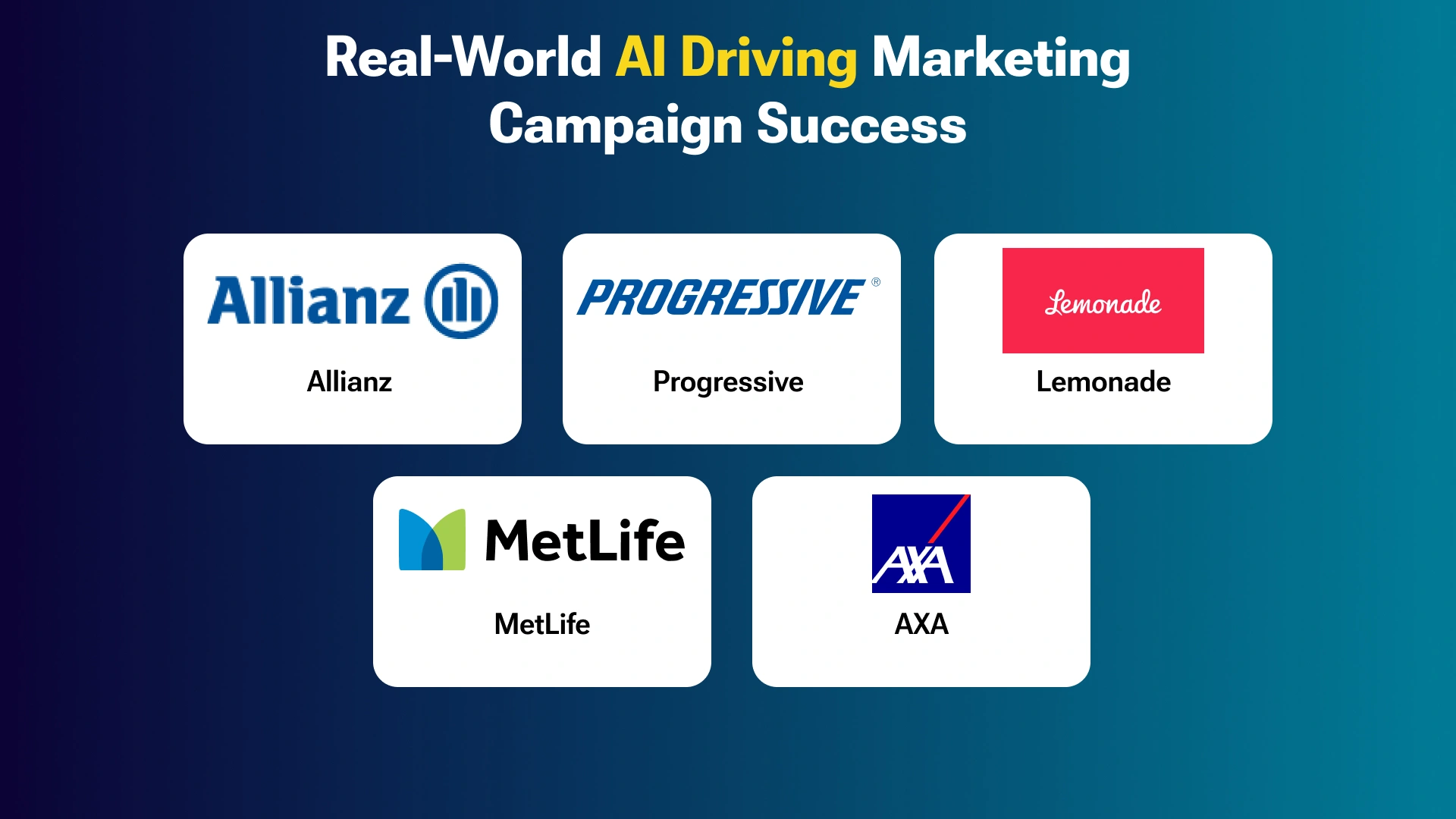
Allianz, one of the world’s leading insurance providers leverages AI to enhance customer experience and marketing efficiency. Their AI chatbot offers real-time assistance, boosting lead conversions. By analyzing customer data and predicting behavior, Allianz tailors AI marketing campaigns, increasing customer retention and improving marketing ROI by 20%.
Progressive, a major player in the U.S. auto insurance market, turned to AI to streamline its digital advertising campaigns. Progressive uses AI to optimize AI in advertising. By analyzing ad performance and customer behavior, they target high-potential customers with personalized AI for advertising, reducing costs and increasing conversions by 25%.
Lemonade, an Insurtech company known for its innovative approach to insurance, uses an AI-powered chatbot, Maya, to automate customer interactions and offers personalized quotes. This improves customer experience and reduces costs. By predicting customer behavior and optimizing ad spend, Lemonade increases customer lifetime value and achieves a 30% higher marketing ROI.
MetLife, a global insurance provider, uses marketing campaign automation through AI to predict customer behavior and optimize marketing campaigns. By analyzing customer data and automated email campaigns and social media, MetLife identifies the best time to send offers, increasing conversion rates by 15% and boosting marketing ROI.
AXA, a multinational insurance firm, uses AI to optimize social media content and ad campaigns. By analyzing trends and customer sentiment, AXA creates engaging content and targets the right audience. This AI-driven approach has led to a 20% increase in customer engagement and a 17% boost in AI-driven digital marketing ROI.
These examples of Allianz, Progressive, Lemonade, MetLife, and AXA clearly demonstrate that AI-optimized campaigns can significantly increase marketing ROI. For insurance company owners, embracing AI is no longer a luxury; it’s a necessity.
By leveraging predictive analytics, personalization, marketing campaign automation, and real-time optimization, these companies have transformed their marketing strategies, enabling them to not only acquire more customers but also retain them for longer periods.
For insurance company owners, embracing AI is no longer a luxury; it’s a necessity. The efficiency gained through AI solutions for insurance marketing campaigns leads to better targeting, increased conversions, reduced costs, and ultimately, a higher return on investment. Investing in AI-optimized campaigns will not only future-proof your marketing efforts but also help your insurance business stand out in a highly competitive market.
As AI in insurance market continues to evolve, the potential for even greater advancements in marketing optimization is immense. Therefore, insurance businesses should act now to integrate AI in marketing strategy and unlock its full potential for maximizing ROI.
Future Trends of AI in insurance
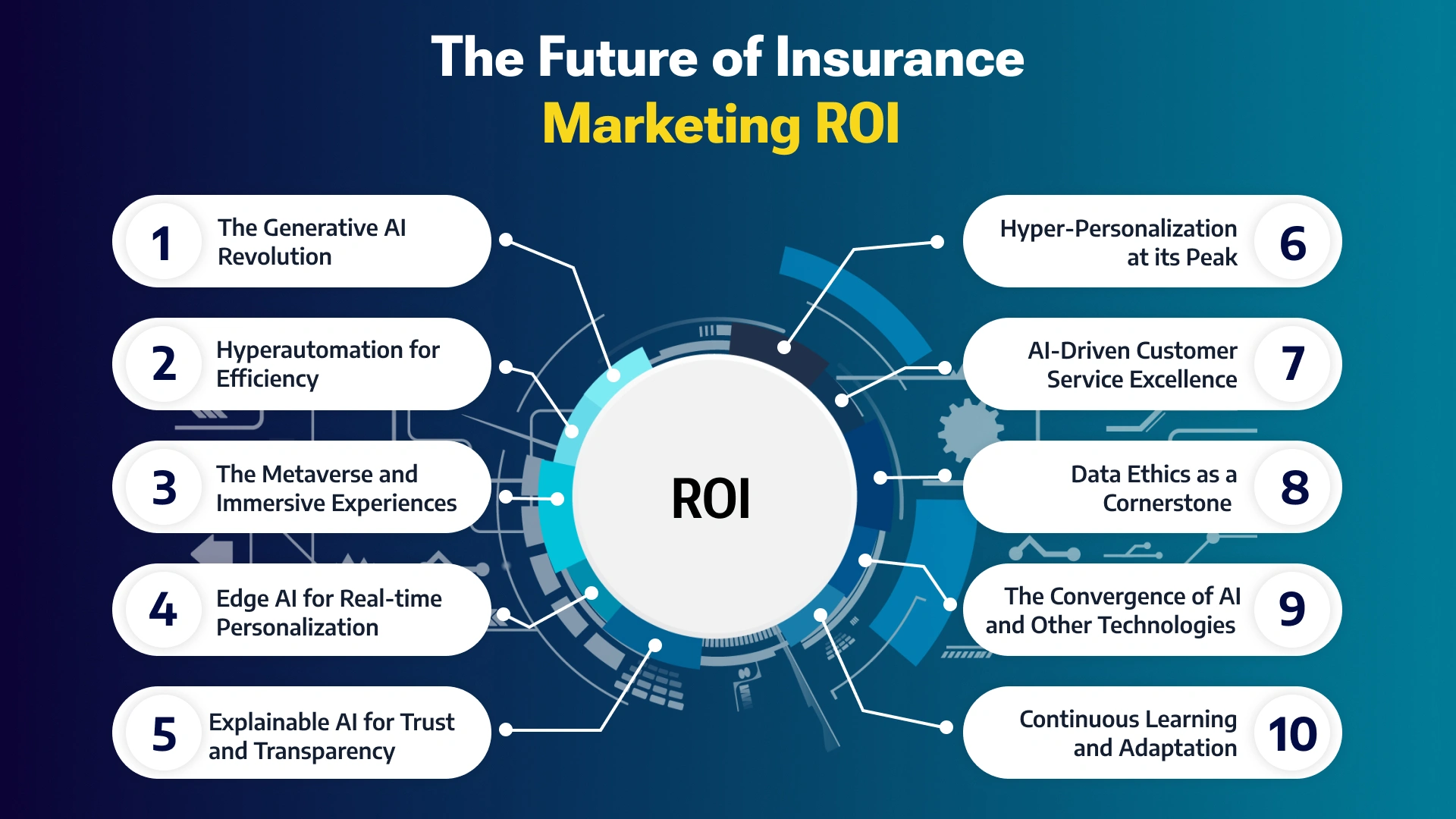
The insurance landscape is undergoing a significant transformation, driven by the continuous advancements of AI and ML technologies that are revolutionizing digital transformation.
Several key trends will shape the future of marketing campaign ROI:
The Generative AI Revolution: The rise of generative AI such as Gemini AI, and Devin AI, revolutionizes content creation, enabling the production of highly personalized and engaging content at scale. Generative AI insurance marketing tools will generate compelling website copy, craft targeted social media posts, and even create personalized video messages, all tailored to individual customer needs and preferences.
Hyperautomation for Efficiency: The increasing marketing campaign automation of insurance industry market tasks through AI and machine learning will streamline operations and free up valuable resources. Innovative cybersecurity technology team can focus on strategic initiatives like customer relationship building, product innovation, and developing deeper customer insights.
The Metaverse and Immersive Experiences: The metaverse will offer new avenues for immersive and interactive marketing experiences. Insurers can leverage virtual and augmented reality technologies to create engaging brand experiences, offer virtual product demonstrations, and build stronger customer relationships within this evolving digital realm.
Edge AI for Real-time Personalization: The deployment of AI solution in insurance market at the edge will enable real-time personalization and insights, even with limited connectivity. This is crucial for mobile marketing and on-demand services, allowing insurers to deliver hyper-personalized offers and experiences in real time, regardless of location.
Explainable AI for Trust and Transparency: As AI in digital marketing plays a more prominent role to build trust and transparency. Explainable AI (XAI) will be crucial for understanding and explaining the decision-making processes of AI algorithms. This transparency will build customer confidence and address concerns regarding data privacy and security.
Hyper-Personalization at its Peak: AI will power hyper-personalization to unprecedented levels, tailoring every aspect of the customer experience, from product recommendations and pricing to communication channels and service delivery. This will create highly customized and engaging customer journeys that foster loyalty and drive revenue.
AI-Driven Customer Service Excellence: AI-powered chatbots and virtual assistants will evolve to become more sophisticated, providing seamless and personalized customer support across all channels. These intelligent agents will not only answer queries but also anticipate customer needs and proactively offer solutions.
Data Ethics as a Cornerstone: Data ethics and responsible AI usage will be paramount. Insurers must prioritize data privacy, security, and fairness in all AI-powered initiatives, ensuring that customer data is used responsibly and ethically.
The Convergence of AI and Other Technologies: AI will increasingly integrate with other emerging technologies like blockchain, the Internet of Things (IoT), and the metaverse, creating innovative and personalized customer experiences that were previously unimaginable.
Continuous Learning and Adaptation: The future of AI is constantly evolving. Insurers must embrace a culture of continuous learning and adaptation, staying abreast of the latest advancements and exploring new ways to leverage AI to enhance their marketing strategies and achieve sustainable growth.
Partner with VLink to Leverage AI for Insurance Marketing Success
The revolution of generative AI in insurance market is unstoppable in this age of innovation. Insurance companies that embrace and take advantage of their potential will thrive in a market that is becoming increasingly competitive, where flexibility and adaptability are essential for success.
Ready to optimize your insurance marketing campaigns and maximize your ROI with the power of AI integration?
VLink delivers AI-powered software development solutions that generate measurable results, transforming insurance marketing from guesswork to data-driven success. Our deep expertise empowers you to precisely target ideal customer segments, crafting personalized experiences that resonate and drive conversions.
We automate key marketing processes, freeing your team to focus on strategic initiatives and creative campaign development. Partner with VLink and unlock the full potential of AI to drive innovation, enhance customer satisfaction, and achieve sustainable growth in the competitive insurance market.










 Shivisha Patel
Shivisha Patel




